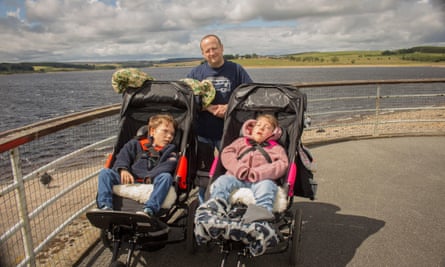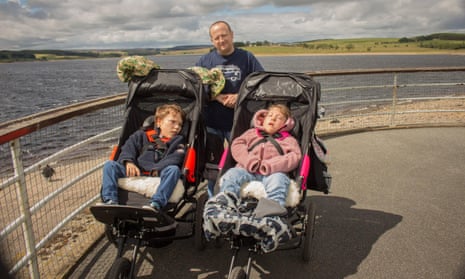The UK is on track to meet its target to vaccinate its most vulnerable people against the coronavirus by Monday, Downing Street has said. However, a number of high-risk groups have been missed off the priority list for the vaccine. The Guardian has heard from more than 500 readers who are struggling to gain early access to the vaccine, ranging from people with ineligible underlying health conditions to parent carers of children with complex disabilities, and adults with learning disabilities.
‘This vaccine situation makes us feel forgotten about’

“My wife and I have 10-year-old twins with complex health needs – Emily has profound multiple learning disabilities and is quadriplegic. She is tube-fed and has choking issues, which require her to need constant one-to-one monitoring. Her brother, Christopher, has profound cerebral palsy, which makes him completely quadriplegic; epilepsy causes him to stop breathing and he also has a tracheostomy, overnight oxygen and is tube-fed.
“This [vaccine] situation make us feel forgotten about. The government rightly acknowledged the importance of the work of frontline health and social care workers in supporting disabled people by making them priority one for the vaccine. But the vast majority of care for disabled children is done by parents, and we’re priority six. The government needs to acknowledge that omission and take action to keep vulnerable children safe.” Paul, 44, Gateshead
‘I fear many with ME won’t have the energy or ability to fight’

“I have chronic fatigue syndrome (ME) and catching coronavirus would exacerbate it greatly, perhaps even permanently. Previous infections of this nature have knocked me off my feet for months at best, caused permanent damage at worst. Although the guidance allows for other conditions to be included in priority group 6, ME/CFS is not mentioned on the list. I fear many with ME won’t have the energy or ability to fight and/or a GP willing to advocate for them.
“I fully support those whose lives are more at risk than mine being ahead of me in the queue, but at some point people for whom coronavirus would significantly affect pre-existing conditions have to be prioritised. If vaccination is about protecting people’s health and reducing strain on the NHS, the effect of coronavirus on pre-existing conditions has to be a consideration on the priority list.” Marie, 30, Suffolk
‘I am very worried how badly I could be ill and I won’t be able to keep working’
“I get the flu jab every year as respiratory viruses really hit me hard. I take a daily inhaled steroid as well as a daily tablet for my asthma and still get symptoms. However, JCVI guidelines now state only asthmatics on steroid tablets will be in the priority group. As it stands I will need to wait with everyone healthy in my age group. Asthma is also considered a risk factor for long Covid, and if I get that on top of ME, I may as well give up.
“I have huge concerns that things will open back up and my chances of catching this will increase. It won’t be realised that some clinically vulnerable have not been given a vaccine. I am very worried how badly I could be ill [long-term] … and that I won’t be able to keep working.” Anonymous
‘I am at high risk due to needing assistance shopping’
“I’m 26 and registered blind, and will likely have to wait until the autumn to receive my first vaccine. Despite not being considered clinically extremely vulnerable (CEV), I am at high risk due to needing assistance shopping, and my lack of depth-perception, which makes it hard to socially distance.
“Many of us also require close contact help and support, like sighted guides, [but have] had to do without that support throughout the whole of the pandemic, and put ourselves more at risk.
“[Not getting vaccine priority] means another whole year of staying and working from home, not being able to see my vulnerable family members, friends, and being scared of mixing with people outdoors. I get very anxious about not knowing exactly how socially distanced I am, so having that deep fear for another year is really disheartening.” Charles, 26, Coventry

‘People should be mindful that not all disabilities are visible’
“I’m 46 and unable to work due to suffering from mild autism [and a learning disability]. Living in fear of becoming seriously ill and dying from Covid-19, I have been shielding since September, only going out for medical appointments, exercise etc. I do not go into shops any more as there is a chance I shall be unfairly challenged for not wearing a mask. I am exempt from doing so, and wear a sunflower lanyard to prove it. However, there is always someone who won’t accept it and challenges me unfairly. It is so unfair when people should be mindful that not all disabilities are visible. The vaccine would give me and my husband (who is my carer) peace of mind and protection. It would also enable us to see our families again physically, after more than six months.
“My GP does not recognise that I am in a risk group, even though it is acknowledged that my husband is my carer, so I’m told am not eligible for the vaccine. The vaccine priority list puts people like myself at an unfair disadvantage, as it does not include mild learning disabilities.” Frances-Mary Pratt, West Oxfordshire
Additional reporting by Tobi Thomas
